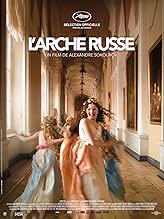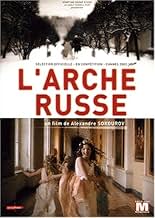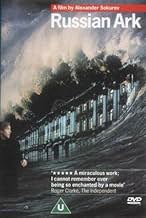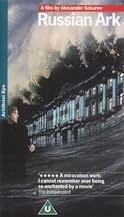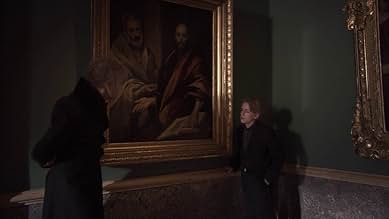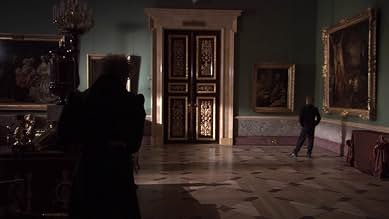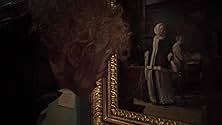AVALIAÇÃO DA IMDb
7,2/10
23 mil
SUA AVALIAÇÃO
Um aristocrata francês do século XIX, conhecido por suas memórias contundentes da vida na Rússia, viaja pelo Museu Hermitage da Rússia e encontra figuras históricas dos últimos 200 anos.Um aristocrata francês do século XIX, conhecido por suas memórias contundentes da vida na Rússia, viaja pelo Museu Hermitage da Rússia e encontra figuras históricas dos últimos 200 anos.Um aristocrata francês do século XIX, conhecido por suas memórias contundentes da vida na Rússia, viaja pelo Museu Hermitage da Rússia e encontra figuras históricas dos últimos 200 anos.
- Direção
- Roteiristas
- Artistas
- Prêmios
- 10 vitórias e 15 indicações no total
Avaliações em destaque
A 90-minute movie centered on St. Petersburg's Hermitage Museum, filmed in one unbroken take by a digital steadicam, didn't send a lot of Americans racing to buy tickets when it was shown here two or three years ago. The movie, however, is far more than just a technical stunt. It's a unique tour de force with emotional impact.
Russian Ark portrays the Hermitage as a kind of cultural and historical ark floating on centuries of Russian seas. The narrative device is a shadowy eighteenth century Frenchman who wanders the halls and time periods, commenting often with good-natured European condescension on what he sees. He is accompanied by a Russian who is never seen, and who questions him about his comments. The movie ranges through time with appearances of Peter the Great, Catherine II, Pushkin, Nicholas II and his family, generals, maids, flunkies and diplomats. The Frenchman, played with great style by Russian actor Sergei Dreiden, takes us to painting and sculpture galleries, kitchens, ballrooms, storerooms, basements and living quarters as we observe things that happened in the Hermitage over the centuries.
At first, I was very aware of the technical feat of no cuts. Gradually, though, I think most people just relax and accept the skill of the director and photographer, and become immersed in what they are seeing. A kind of unreal imagery takes hold. The movie ends with the last dance held in the Great Ballroom before WWI. Hundreds of actors and dancers, in full costume, swirl around this ornate setting, and swirl around the camera as well, while the camera glides through the crowds. It's a terrific scene, and is followed by the end of the dance with all the hundreds of guests making their way through the halls and staircases to leave the building, with the camera facing them and moving along in front of them.
This is a highly unusual film, probably a great one.
Russian Ark portrays the Hermitage as a kind of cultural and historical ark floating on centuries of Russian seas. The narrative device is a shadowy eighteenth century Frenchman who wanders the halls and time periods, commenting often with good-natured European condescension on what he sees. He is accompanied by a Russian who is never seen, and who questions him about his comments. The movie ranges through time with appearances of Peter the Great, Catherine II, Pushkin, Nicholas II and his family, generals, maids, flunkies and diplomats. The Frenchman, played with great style by Russian actor Sergei Dreiden, takes us to painting and sculpture galleries, kitchens, ballrooms, storerooms, basements and living quarters as we observe things that happened in the Hermitage over the centuries.
At first, I was very aware of the technical feat of no cuts. Gradually, though, I think most people just relax and accept the skill of the director and photographer, and become immersed in what they are seeing. A kind of unreal imagery takes hold. The movie ends with the last dance held in the Great Ballroom before WWI. Hundreds of actors and dancers, in full costume, swirl around this ornate setting, and swirl around the camera as well, while the camera glides through the crowds. It's a terrific scene, and is followed by the end of the dance with all the hundreds of guests making their way through the halls and staircases to leave the building, with the camera facing them and moving along in front of them.
This is a highly unusual film, probably a great one.
I found "Russian Ark" a fascinating work of a very ambitious director. For me, it was a highly enjoyable guided tour through the rooms, galleries, and halls of one of the greatest museums in the world. I have not been to Hermitage (Winter Palace) for over fourteen years, and to see the familiar rooms, stairs, paintings, and sculptures was like traveling back in time. The film is also the journey over three hundred years of the Russian history and the attempt to understand the country's place and meaning in European culture. Each of the palace's rooms is filled with memories, shadows, whispers, smiles, and tears of the people whose lives have made the history of the country. The fact that it is all presented in a single, the longest uninterrupted shot ever makes it even more incredible. I also saw the documentary about making "Russian Ark". It is called "On One Breath" - that's how the director, Alexander Sokurov wanted his audience to feel about the film that was shot in a single glorious take during several hours on one winter night. The preparation for this unforgettable night took almost four years.
10lawprof
Western fascination with Russia -whether the land of the Tsars or the cruel empire of the madman Stalin - is one of our unending cultural fixations. Endlessly studied, painstakingly analyzed, mocked and admired - Russia is a massive, ongoing colossal story. An enigma that never yields its deepest secrets.
Director Aleksandr Sokurov is the voice of the anonymous inquisitor who accompanies nineteenth century French marquis Sergei Dreiden (Sergei Dontsov) on a breathtaking tour of the physical and spiritual Hermitage of St. Petersburg. He has made a groundbreaking, stunning film. Shot from a Steadycam in one continuous over hour-and-a-half stream, the film explores the treasures of one of the world's greatest museums. Equally, "Russian Ark" rambles, without regard for chronological order, through snatches of Russian and Soviet history, each short episode a fantastical peep into a wild, rich, often terrifying but always fascinating world.
In the nineteenth century European travellers, most often men (Charles Dickens, for example) and some women (Fanny Trollope for one) visited and wrote about the two untamed civilizations that beckoned to foreigners and promised adventure and intrigue: Russia and the United States. Count Dreiden, a not atypical Frenchman of haughty self-assurance and ample means, viewed Russians as boorish and their culture a gilt-splendored front for a nearly barbarous land. His book would not have been picked up by a publisher linked to the travel industry.
In "Russian Ark" Dreiden is more muted than he is in print but his unquestioning cynicism comes through as Sokurov captures the imagined journey in one building of a French nobleman through both his time and a future he questions without developing much understanding.
So we have both an Acoustaguide tour of a wonderful palace of culture and myriad treasures and snapshots of everyone from Catherine the Great to Nicholas and Alexandra and their children, including an adorable Anastasia, fated to be one of history's silly mysteries. Noblemen and contemporary sailors, bemedaled officers and bejeweled women, a cultured woman gallery guide and apparatchiks - they all fleet through and interact with the questioning but stolidly biased Frenchman.
How did Sokurov pull off a continuous take through over 4,200 feet of the Hermitage with a cast of many hundreds, gorgeously costumed, without a hitch? Unbelievable! That feat alone propels him into the Cinema Pantheon of Fame. At times I felt like I was drawn into the crowd, especially when they depart a dance to head for a fabulous banquet (the dance band is conducted by Valery Gergiev, the only famous - to Westerners - person in the film). And even though I knew from reviews that Sokurov pulled it off, I kept waiting for the seemingly inevitable "Cut!" following a miscue or stumble.
The hint of intrigue and menace that is so much part of Russia's past and present lurks behind an almost impressionistic front with scenes of one-dimensional gaiety almost but not entirely hiding a complex society. Sokurov teaches and teases simultaneously.
As visual splendor and directorial innovation this is one of the great films of our time. I look forward to owning it on DVD knowing that its magic can never be realized fully outside a theater.
Don't miss this one and see it more than once.
10/10.
Director Aleksandr Sokurov is the voice of the anonymous inquisitor who accompanies nineteenth century French marquis Sergei Dreiden (Sergei Dontsov) on a breathtaking tour of the physical and spiritual Hermitage of St. Petersburg. He has made a groundbreaking, stunning film. Shot from a Steadycam in one continuous over hour-and-a-half stream, the film explores the treasures of one of the world's greatest museums. Equally, "Russian Ark" rambles, without regard for chronological order, through snatches of Russian and Soviet history, each short episode a fantastical peep into a wild, rich, often terrifying but always fascinating world.
In the nineteenth century European travellers, most often men (Charles Dickens, for example) and some women (Fanny Trollope for one) visited and wrote about the two untamed civilizations that beckoned to foreigners and promised adventure and intrigue: Russia and the United States. Count Dreiden, a not atypical Frenchman of haughty self-assurance and ample means, viewed Russians as boorish and their culture a gilt-splendored front for a nearly barbarous land. His book would not have been picked up by a publisher linked to the travel industry.
In "Russian Ark" Dreiden is more muted than he is in print but his unquestioning cynicism comes through as Sokurov captures the imagined journey in one building of a French nobleman through both his time and a future he questions without developing much understanding.
So we have both an Acoustaguide tour of a wonderful palace of culture and myriad treasures and snapshots of everyone from Catherine the Great to Nicholas and Alexandra and their children, including an adorable Anastasia, fated to be one of history's silly mysteries. Noblemen and contemporary sailors, bemedaled officers and bejeweled women, a cultured woman gallery guide and apparatchiks - they all fleet through and interact with the questioning but stolidly biased Frenchman.
How did Sokurov pull off a continuous take through over 4,200 feet of the Hermitage with a cast of many hundreds, gorgeously costumed, without a hitch? Unbelievable! That feat alone propels him into the Cinema Pantheon of Fame. At times I felt like I was drawn into the crowd, especially when they depart a dance to head for a fabulous banquet (the dance band is conducted by Valery Gergiev, the only famous - to Westerners - person in the film). And even though I knew from reviews that Sokurov pulled it off, I kept waiting for the seemingly inevitable "Cut!" following a miscue or stumble.
The hint of intrigue and menace that is so much part of Russia's past and present lurks behind an almost impressionistic front with scenes of one-dimensional gaiety almost but not entirely hiding a complex society. Sokurov teaches and teases simultaneously.
As visual splendor and directorial innovation this is one of the great films of our time. I look forward to owning it on DVD knowing that its magic can never be realized fully outside a theater.
Don't miss this one and see it more than once.
10/10.
An unnamed and unseen filmmaker finds himself in the Hermitage museum in St Petersburg in what appears to be the 18th Century. No one seems to be able to see him except his travelling companion, Frenchman Marquis de Custine, who he talks to. Together the two of them go around the museum, flitting between time as they go, gradually covered 300 years of Russian history.
I was drawn to this film as I have recently had to install digital television in my house (just for 24!) and I figured that I might as well see what the channels had to offer. After working out that I had access to numerous shopping channels I also found that I had BBC4, the arts and history channel, and that it was to be showing this film. I was interested in it not for my love of Russian history but for the fact that it was done in one take and, for that reason, I quite enjoyed it.
As far as plot goes, I really think you need to have an existing knowledge of Russian history as this film will not help you understand anything about it other than a passing impression. This was the case for me as I know next to nothing of the history, but I was still able to gleam some things about the political relationships between Russia and Europe as well as some of the main players. However it never got to the point where I was taken or engaged by the material; interested is perhaps a more fitting word to use - and that's still a good thing.
Technically the film is gripping and very impressive. Much was made of Snake Eye's 20 minute one-take opening (even thought it was actually 3 takes) or Goodfella's seamless move from street to table, but this film blows them away. I cannot even imagine the sheer logistics involved in creating such an effect. It would be impressive if the film was all shot in one room with a few cast members, but this film moves around the museum with a cast of thousands and set pieces that vary from two people looking at paintings to a massive ballroom scene. I was held totally impressed by the whole film as the entire one take was delivered seamlessly, without flaw. For this reason the acting is impressive whether it is Dontsov's acerbic Frenchman or just some extra's - everyone had to get it right bang on time and they did.
Overall this film will be a masterpiece if you have a good working knowledge and understanding of Russian history. However even if you don't know that much (like me), the technical aspect of this film will impress you no end even if the material is best seen as `interesting' at best.
I was drawn to this film as I have recently had to install digital television in my house (just for 24!) and I figured that I might as well see what the channels had to offer. After working out that I had access to numerous shopping channels I also found that I had BBC4, the arts and history channel, and that it was to be showing this film. I was interested in it not for my love of Russian history but for the fact that it was done in one take and, for that reason, I quite enjoyed it.
As far as plot goes, I really think you need to have an existing knowledge of Russian history as this film will not help you understand anything about it other than a passing impression. This was the case for me as I know next to nothing of the history, but I was still able to gleam some things about the political relationships between Russia and Europe as well as some of the main players. However it never got to the point where I was taken or engaged by the material; interested is perhaps a more fitting word to use - and that's still a good thing.
Technically the film is gripping and very impressive. Much was made of Snake Eye's 20 minute one-take opening (even thought it was actually 3 takes) or Goodfella's seamless move from street to table, but this film blows them away. I cannot even imagine the sheer logistics involved in creating such an effect. It would be impressive if the film was all shot in one room with a few cast members, but this film moves around the museum with a cast of thousands and set pieces that vary from two people looking at paintings to a massive ballroom scene. I was held totally impressed by the whole film as the entire one take was delivered seamlessly, without flaw. For this reason the acting is impressive whether it is Dontsov's acerbic Frenchman or just some extra's - everyone had to get it right bang on time and they did.
Overall this film will be a masterpiece if you have a good working knowledge and understanding of Russian history. However even if you don't know that much (like me), the technical aspect of this film will impress you no end even if the material is best seen as `interesting' at best.
Focusing on three centuries of Russian history from Peter the Great to Tsar Nicholas II, Russian Ark, the latest film by Alexander Sokurov, is an amazing tour de force. Shot in one long 96-minute tracking shot with a cast of 2000 actors and extras, the film takes the viewer into the great Hermitage Collection in St. Petersburg, Russia, showing real works of art from 33 rooms and exploring their meaning in a larger context. More than just a great technical achievement, this is also a sublime meditation on the individual's place in the universe, one that does not recreate history but allows us to revisit it on a dreamlike stage where past, present, and future are one.
The film begins in the dark with the narrator (apparently Sokurov) commenting about how little he sees. "My eyes are open", he says, "and yet I see nothing". He does not know where he is but apparently has just died in an accident of some kind. Is this a movie? A play?" he asks. He receives no answer except a vision of 18th century aristocrats moving slowly into the Tsar's palace. An elegant white-haired man in a black cloak (Sergey Dreiden) suddenly appears and escorts the confused narrator into the corridors of the grand palace. "Everyone knows the present, but who can remember the past", says the stranger as they walk from one ballroom to the next, witnessing great works of art as well as ghost-like presences from Russia's past. We see works by El Greco, Rubens and Van Dyck in their awesome splendor. We run into Peter the Great thrashing a general, Catherine the Great looking for the bathroom, and Nicholas II, the last Russian Tsar hosting the Great Royal Ball of 1913, the last such formal occasion of its kind.
As we enter the Great Nicholas Hall, the opulent room is filled with thousands of aristocrats dancing the mazurka in gorgeous period costumes. A full orchestra is playing in the background and young soldiers are nattily dressed in their uniforms. How beautiful it all seems and how it appears they were destined to live forever but we all know how the nasty Bolsheviki spoiled the party. Ah yes, how green was my valley then. Sokurov said he wanted to make a whole film "in one breath" and he has succeeded in simulating the breathing process, pulling us in, then moving us out as we feel the rhythm of our own life beating with the swirl of lost humanity. At the end of Russian Ark, we see the peaceful flow of a river outside the hall to which the narrator comments, "The flow is forever. Life is forever." Having completed the past, our invisible guide is now ready to move into the endless silence that is, in the phrase of the Anglican priest Thomas Kelly, "the source of all sound".
The film begins in the dark with the narrator (apparently Sokurov) commenting about how little he sees. "My eyes are open", he says, "and yet I see nothing". He does not know where he is but apparently has just died in an accident of some kind. Is this a movie? A play?" he asks. He receives no answer except a vision of 18th century aristocrats moving slowly into the Tsar's palace. An elegant white-haired man in a black cloak (Sergey Dreiden) suddenly appears and escorts the confused narrator into the corridors of the grand palace. "Everyone knows the present, but who can remember the past", says the stranger as they walk from one ballroom to the next, witnessing great works of art as well as ghost-like presences from Russia's past. We see works by El Greco, Rubens and Van Dyck in their awesome splendor. We run into Peter the Great thrashing a general, Catherine the Great looking for the bathroom, and Nicholas II, the last Russian Tsar hosting the Great Royal Ball of 1913, the last such formal occasion of its kind.
As we enter the Great Nicholas Hall, the opulent room is filled with thousands of aristocrats dancing the mazurka in gorgeous period costumes. A full orchestra is playing in the background and young soldiers are nattily dressed in their uniforms. How beautiful it all seems and how it appears they were destined to live forever but we all know how the nasty Bolsheviki spoiled the party. Ah yes, how green was my valley then. Sokurov said he wanted to make a whole film "in one breath" and he has succeeded in simulating the breathing process, pulling us in, then moving us out as we feel the rhythm of our own life beating with the swirl of lost humanity. At the end of Russian Ark, we see the peaceful flow of a river outside the hall to which the narrator comments, "The flow is forever. Life is forever." Having completed the past, our invisible guide is now ready to move into the endless silence that is, in the phrase of the Anglican priest Thomas Kelly, "the source of all sound".
Você sabia?
- CuriosidadesShot in a single take. The first three attempts were cut short by technical difficulties, but the fourth was successful.
- Erros de gravaçãoMany extras look to the camera and they quickly return to a default mark.
- Citações
The Time Traveller: Sir. Sir. A pity you're not here with me. You would understand everything. Look. The sea is all around. And we are destined to sail forever, to live forever.
- ConexõesEdited into Spisok korabley (2008)
- Trilhas sonorasMazurka
(from opera "A Life For The Tsar")
Music by Mikhail Glinka
Performed by Mariinsky Theatre Orchestra
Conducted by Valery Gergiev
Principais escolhas
Faça login para avaliar e ver a lista de recomendações personalizadas
- How long is Russian Ark?Fornecido pela Alexa
Detalhes
- Data de lançamento
- Países de origem
- Idiomas
- Também conhecido como
- Russian Ark
- Locações de filme
- Empresas de produção
- Consulte mais créditos da empresa na IMDbPro
Bilheteria
- Faturamento bruto nos EUA e Canadá
- US$ 3.048.997
- Fim de semana de estreia nos EUA e Canadá
- US$ 29.022
- 15 de dez. de 2002
- Faturamento bruto mundial
- US$ 8.691.860
- Tempo de duração
- 1 h 39 min(99 min)
- Cor
- Mixagem de som
- Proporção
- 1.78 : 1
Contribua para esta página
Sugerir uma alteração ou adicionar conteúdo ausente






